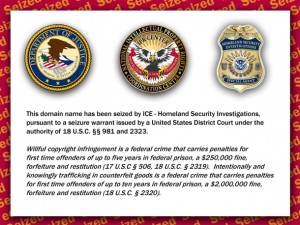The Rise of Web Censorship


ICE has shut down dozens of file-sharing and what are alleged to be counterfeit good sites such as Torrent-Finder.com, 2009jerseys.com, and Dvdcollects.com. Their domain names have been taken over by ICE leaving behind only a single page stating that "This domain name has been seized by ICE--Homeland Security Investigations, pursuant to a seizure warrant issued by a United States District Court."
In a statement to the New York Times, Cori W. Bassett, a spokesperson for ICE said that the "ICE office of Homeland Security Investigations [had] executed court-ordered seizure warrants against a number of domain names."
Fine and dandy. I have no use for sites that traffic in counterfeit goods such as fake autographed sports jerseys or designer purses. I do, on the other hand, worry when a site like Torrent-Finder is shut down.
You see, Torrent-Finder, which is back up under a new domain name, Torrent-Finder.info doesn't host Torrent file or even BitTorrent file trackers. It's just a search engine dedicated to file torrents such as movies, TV shows, or software programs. You can find the same file torrents with Google if you know what you're doing. Torrent-Finder, and sites like it, just makes specific kinds of file searches easier.
I think it's fine for the government to try to block the sales of fake LeBron James Miami Heat jerseys and the like. It's when we start moving into the murkier land of intellectual property and the "right" to block searches, that I start getting worried.
I have reasons. On November 26th, a Swedish court upheld the copyright convictions of three of the four founders of The Pirate Bay, the world's most famous file-sharing Web site.
Days earlier, thanks to the lobbying of the Motion Picture Association of America (MPAA) and the Recording Industry Association of America (RIAA), a U.S. Senate committee approved, by a unanimous vote, the COICA (Combating Online Infringement and Counterfeits Act) bill. COICA would make not only the people hosting file sharing search sites but ISPs and the Internet bodies responsible for the Domain Name System (DNS) responsible for possible copyright violations.
As a group of law professors wrote for the public interest group Public Knowledge wrote, "The Act, if enacted into law, would fundamentally alter U.S. policy towards Internet speech (PDF Link), and would set a dangerous precedent with potentially serious consequences for free expression and global Internet freedom. " Furthermore, the law would let sites be shut down without a chance to protect themselves. "In place of a final determination after an adversary proceeding that the website in question contain infringing material, the Act permits the issuance of speech- suppressing injunctions without any meaningful opportunity for any party to contest the Attorney General's allegations of unlawful content."
It's not just the U.S. In the U.K., the Serious and Organised Crime Agency (SOCA) is seeking the right to order Nominet, the Internet registry for the .uk block of domain addresses, to shut down United Kingdom registered domain names upon police demand. Just as with COICA, the SOCA could get the right to shut down Web sites first and then only afterwards have a court decide if the decision was justified.
I have no problem with law-enforcement agencies having the power to stop crimes. What I do have a problem with is them being given carte blanche to decide on their own, whenever they want, anywhere in the world, when a Web site should be shut down. That is a power that should never belong to the police alone of any country.